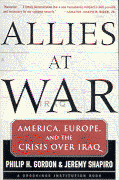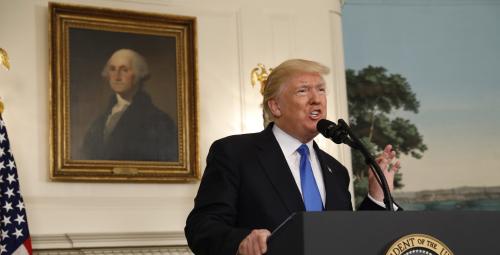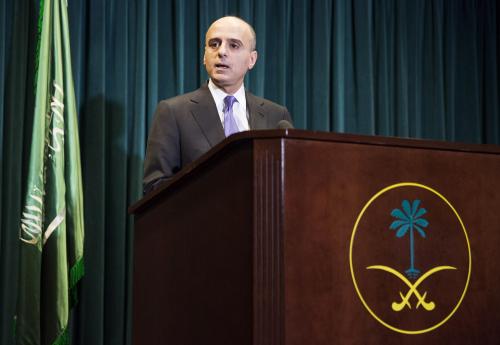The United States is failing in its diplomacy in the Middle East, writes Dan Byman. We are standing by when partners like the Kurds and the Iraqi government fight each other and allowing longtime friends like Saudi Arabia, Qatar, and the UAE engage in behavior they may well soon regret and get into bed with foes like Iran. Being a sober helper to our friends is not glamorous, but without its wingman, the world is a more dangerous place. This post originally appeared on Lawfare.
Many critiques of President Donald Trump’s foreign policy concern his open brinksmanship with enemies like North Korea or jarring antagonism of rivals like China and Iran. But much of the administration’s worst behavior concerns how it treats America’s friends.
The United States has long tried to aid and reassure its allies, helping them defend themselves and achieve their goals. America also brought its friends together, helping turn historic enemies like Germany and France or Japan and Korea into allies in their own right. The American track record is hardly perfect—as the Kurds, South Vietnamese, and others can attest. Yet such abandonment is the exception, not the rule, and the United States emerged as the leader of the free world in large part because its allies trusted it to do the right thing (if only, in a remark often attributed to Winston Churchill, after exhausting all the other alternatives). Whether it was to keep the Russians out of Europe during the Cold War, liberate Kuwait from Iraqi aggression, or build a robust global trading order, it was America that assembled coalitions, provided military muscle, and was there in the dark hours when our friends needed us most.
In short, America was our allies’ wingman: We protected and guided our friends, and we helped them form relationships with others.
A good wingman doesn’t abandon friends. A good wingman doesn’t let friends embarrass themselves or engage in destructive behavior that a friend will regret the next day. And importantly, a good wingman doesn’t let a friend go home with the wrong partner. Under Trump, the United States is failing in all these roles, and the world is suffering as a result.
A good wingman doesn’t abandon friends.
Let’s consider two current crises in the Middle East. In the Persian Gulf, Saudi Arabia and the United Arab Emirates (UAE) are leading others in the region to isolate and punish Qatar. All three states are allies of America and vital for military operations, opposing Iran, counterterrorism efforts and other goals. The campaign is ostensibly in response to Qatar’s (often quite real) ties to terrorist groups, but really, it’s because Qatar and its neighbors back different horses, especially the Muslim Brotherhood, in the wake of the Arab Spring. The bickering has dragged on for months, and Turkey is now taking Qatar’s side, establishing a military base there.
Meanwhile in Iraq, the government in Baghdad and the Kurdish Regional Government, both of which worked closely with the United States to fight the Islamic State, have now turned their guns on each other in a contest for Kirkuk and other disputed territory in the Kurdistan region.
The infighting in both crises makes the situation worse for all concerned. It may no longer control cities, but the Islamic State has not been defeated. The group has gone underground in the past, and it is doing so again and will try to exploit local fissures to reestablish itself. Iran also exploits local divisions to increase its influence. If the Gulf states are not united, they are less able to decrease Iran’s sway in Iraq, present a united front on the civil war in Syria, or otherwise achieve goals that benefit all of them.
The Trump administration’s response has been to do nothing or, even worse at times, to cheer on one side’s self-destructive behavior—as when it embraced Riyadh’s position uncritically with regard to the dispute with Doha. And even when we are silent in the face of an ally’s misdeeds, we don’t get much. The United States may have acquiesced to Baghdad’s seizure of disputed Kirkuk, but the Washington’s tepid leadership meant our objections over the use of Iranian-aligned Shiite militias were ignored by the Iraqi government. Instead, the United States looks powerless as the dispute continues—weakly asserting it is just a “misunderstanding”—while the Kurds feel abandoned yet again.
The civil war in Yemen is another example of the United States enabling the same Gulf allies to engage in a blatantly counterproductive war. The Saudi-led coalition has spent two-and-a-half years in Yemen, producing international opprobrium, a greater humanitarian crisis, and more chaos for al Qaeda, Iran, and the Islamic State to exploit. Although there have been repeated calls and even some efforts to end U.S. military support to the coalition (including aerial refueling, intelligence, maintenance, and other combat support), which would effectively compel the Saudis to end their intervention, the Trump administration has instead ramped up American involvement.
Even worse, the U.S. abandonment of the wingman role allowed U.S. adversaries entrée. To escape its isolation and to put its thumb in Riyadh’s eye, Qatar is expanding ties to Iran. Similarly, Iran is exploiting the chaos between Arabs and Kurds in Iraq to increase its influence there, and any further escalation of violence there could present opportunities for the Islamic State to regain its foothold. In Yemen, Iran is increasing its ties to anti-Saudi Houthi fighters, who need Tehran’s support now more than ever before. Even Russia is taking advantage of the situation by playing a bigger role in Iraqi energy politics and, thus, increasing its sway in both Baghdad and Irbil. In the end, it’s America’s regional foes that are benefiting when America’s friends fight.
What to do is obvious and, unlike so many foreign policy challenges, not all that difficult. The United States should call together the leaders of Qatar, Saudi Arabia and the UAE and press them hard to end their squabbling. The leaders of the states’s biggest concern remains Iranian meddling in the region. But without the United States, even the most powerful of these countries, Saudi Arabia, lacks the strategic capacity to mount a serious challenge to Tehran. All of them are waiting for the United States to take a leadership role. In Iraq too, the United States should use its close ties to the Kurds and extensive relationship with Baghdad to try to stop the fighting and find an acceptable settlement. America has influence; it’s just not using it.
Former Secretary of State George Shultz called for American diplomats to spend much of their time “gardening”—working with allies constantly and especially in the early stages of a crisis. Unfortunately, it looks like the Trump administration is waiting for crises to emerge and only then will it pay attention to the dangers that could have been avoided.
The United States is failing in its diplomacy. We are standing by when partners like the Kurds and the Iraqi government fight each other and allowing longtime friends like Saudi Arabia, Qatar, and the UAE engage in behavior they may well soon regret and get into bed with foes like Iran. Being a sober helper to our friends is not glamorous, but without its wingman, the world is a more dangerous place.
The Brookings Institution is committed to quality, independence, and impact.
We are supported by a diverse array of funders. In line with our values and policies, each Brookings publication represents the sole views of its author(s).











Commentary
Is America a bad wingman in the Middle East?
November 13, 2017